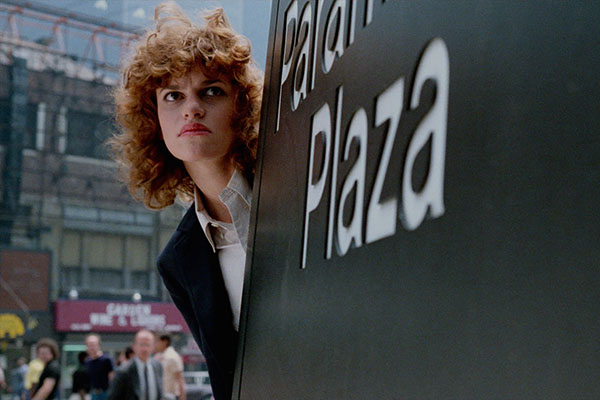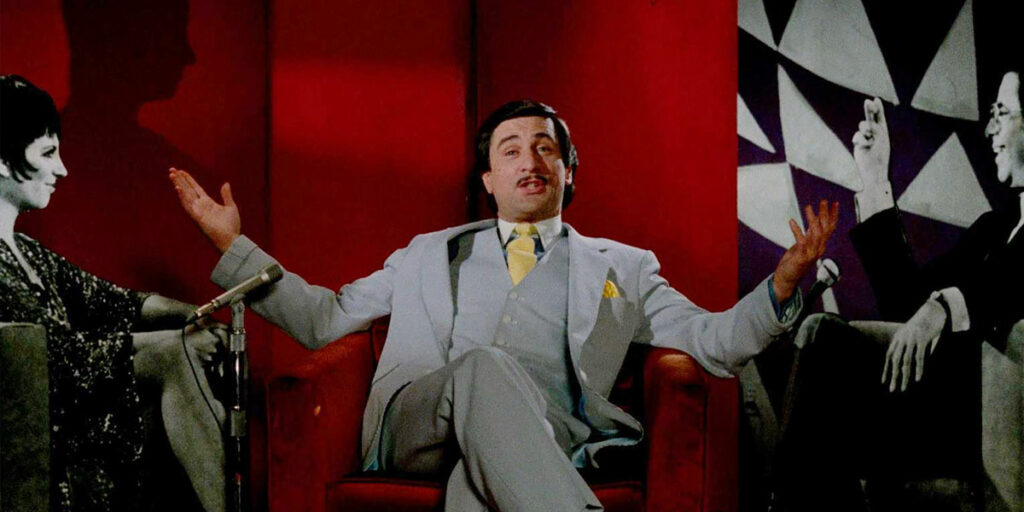In his underrated comedy thriller The King of Comedy, Martin Scorsese offers an astute commentary on celebrity culture.
When you ask someone to identify Martin Scorsese’s best film, you’ll often be met with the answer Taxi Driver (1976), Raging Bull (1980), or GoodFellas (1990). Although these titles are essential to not only his career, but the history of film as whole, it is my opinion that one Scorsese title has slipped through the cracks. Scorsese’s 1982 picture The King of Comedy sees the return of Robert De Niro in their fifth collaboration. This time, De Niro plays fantasist and aspiring comedian Rupert Pupkin, who will stop at nothing to follow in the footsteps of his idol Jerry Langford (Jerry Lewis).
Where The Wolf of Wall Street (2013) is easily marketable as a comedy, and Shutter Island (2010) as a thriller, The King of Comedy teeters somewhere in between. This fact may have been at the core of the film’s initial criticisms, as its refusal to be tethered to one genre left audiences of Mean Streets (1973) and Taxi Driver flailing. But for me, this quirky crime story results in one of Scorsese’s most palatable films to date.
The King of Comedy relies heavily on De Niro’s dialogue, which is energetic and unrelenting throughout, although it’s clear that, behind his charisma and forceful charm, Pupkin’s existence is an isolated one. The only peek at his home reveals cardboard cut-outs he can perform to and an always looming, but never present mother. It’s no wonder, then, that Pupkin’s entire personality reads like a caricature forged from the screen, with Rupert himself unable to tell the difference between what’s on television and what’s real-life. Scorsese inserts us into Rupert’s psyche by flitting between scenes of fantasy and actuality, and as the plot progresses, we’re not sure which is which.
De Niro is joined on-screen by Sandra Bernhard, who plays the equally unhinged Masha. The pair seem to despise one another’s company but must work together in their plight to win Jerry Langford’s affections. What comes as a result are scenes akin to slapstick comedy sketches, with Rupert and Masha fitting together like two puzzle pieces that belong on opposite sides of the finished picture.

The casting of Jerry Lewis as TV personality and comedian Jerry Langford was no accident. The late Jerry Lewis, known for his slapstick humour in film, television, stage, and radio, was often referred to as, would you believe it, ‘The King of Comedy.’ Here, Lewis’ trademarks are undetectable, and the fictional Langford presents himself as a passive man, disillusioned with the world of fame. This depiction of the immortalised celebrity, heightened by Pupkin’s adoration of what is essentially a fictional character, satirises celebrity culture in a way that is still relevant today.
This fever dream film is aided by cinematographer Fred Schuler’s ability to bring Scorsese’s vision to life. The striking imagery includes Pupkin’s home, that looks like a makeshift set of a television show. The camera is used to immerse both Rupert and the viewer in this simulated theatre. New York City acts once again as the backdrop to Scorsese’s narrative, and with Schuler’s touch, the metropolis completely dwarfs Pupkin to make his dreams seem even harder to achieve.
Although it’s not one of Scorsese’s best-received films, The King of Comedy does have its own legacy. In 2019, director Todd Phillips paid homage to the film in his award-winning DC villain origin story Joker. Phillips even went so far as to cast Robert De Niro in essentially the same role that Jerry Lewis has here, adding another layer of irony to the plot. Although Joker’s Arthur Fleck (Joaquin Phoenix) and The King of Comedy’s Rupert Pupkin are similar, they do differ on one thing. Arthur Fleck is a tortured soul, ridiculed on television and ostracised even further from society as a result. On the other hand, when Pupkin finally gets to perform on the Jerry Langford show, his jokes are simply mediocre. As viewers, we wait with bated breath for the boos and the awkward silences after each joke, but they never come and Pupkin is received well overall.
In this way, Pupkin is humanised, as we see he is neither dissimilar to the revered Jerry Langford nor is he unlike us. For the duration of the film, it has been easy to distance ourselves from Pupkin, as we presume he is a terrible comic who will never have success. But his mediocrity humbles us, revealing Pupkin as just another person with aspirations. This revelation leaves the viewer perplexed as the film concludes with ambiguity, Scorsese leaving it up to you to decide how Pupkin’s story ends. Did he really reach fame or is it all just an extension of his fabricated reality?
So, The King of Comedy might not be everyone’s top Scorsese pick, but I still believe it’s one of his most underrated works. It may be somewhat lighter in tone but is still packed full of quintessential Scorsese elements which also makes it perfect for anyone wanting to dip their toes into Scorsese’s filmography for the first time.
The King of Comedy is now available to watch on digital and on demand.

